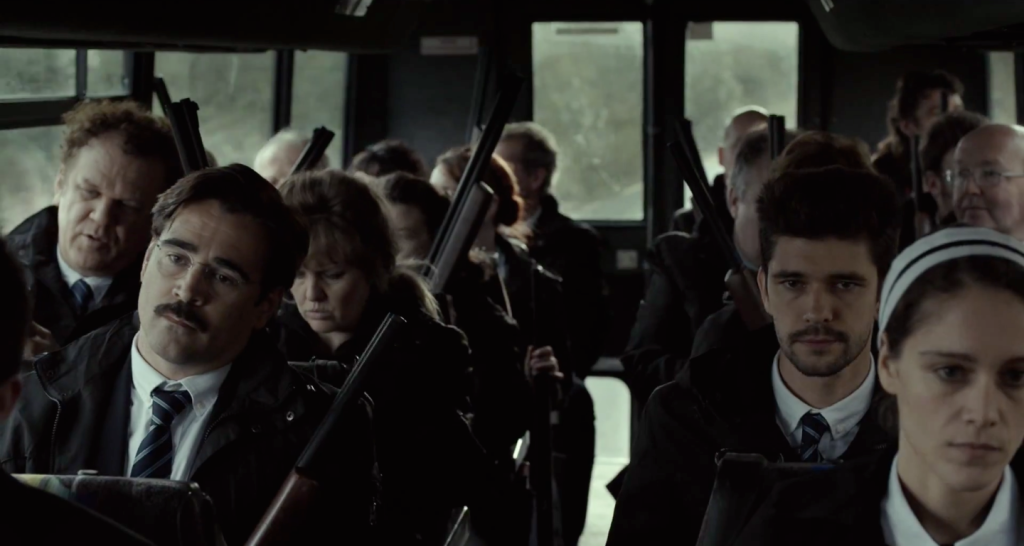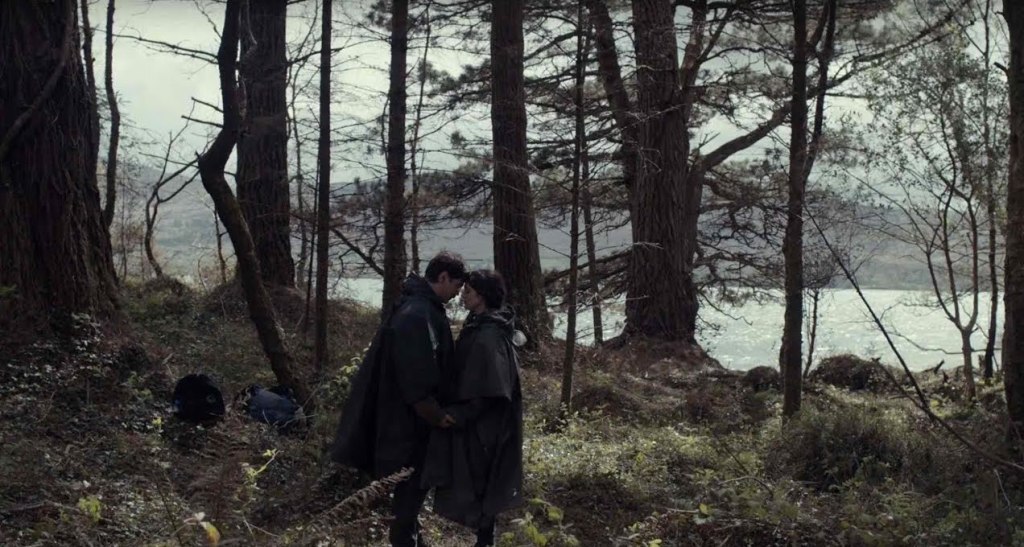“Now have you thought of what animal you’d like to be if you end up alone?”
“Yes, a lobster,” Colin Farrell’s character, David, replies without hesitation.
“Why a lobster?” the hotel manager asks, less curious than prying.
His answer is as thoughtful as it is ridiculous: “Because lobsters live for over 100 years. They’re blue-blooded, like aristocrats, and stay fertile all their lives. I also like the sea very much.”
The premise behind the question might be hilariously absurd, but the characters do not recognize this. They are deeply, unshakably earnest, and it’s hard to argue with their logic. Farrell never betrays his character with a wink to the audience. For David, this is a matter of life or death.
Abandoned by his wife, David checks himself into a hotel full of other single people in order to find someone new. If he cannot find a suitable partner within 45 days, he will be turned into a lobster.
David arrives at this hotel accompanied by his brother, who appears to us as a border collie. “He was here a couple of years ago” as a human, “but he didn’t make it.” David hopes to meet a different fate than his brother, but if he is destined to turn into an animal, he wants it to be one that will maximize his chances of finding and keeping a lifelong mate.
Writer / director Yorgos Lanthimos takes this premise and dissects it viciously and imaginatively. The result is a movie that offers bold, insightful, yet over-the-top commentary on human courtship and dating rituals. The Lobster unfolds as a series of dramatic escalations, each of which simultaneously examine and make fun of the absurd checklists, rules, and requirements that we make for ourselves when we are looking for our perfect mate… and the lengths that many of us go to to be attractive to anyone at all so that we don’t die alone.
In the real world, it isn’t uncommon to hear someone say, “I want to marry someone who is tall, handsome, funny, good with kids, well-educated, and who makes a lot of money.” When we are courting potential life partners, we so often analyze and reduce suitors down to base characteristics and — consciously or subconsciously — compare those characteristics against our own internal checklist. In The Lobster, Lanthimos makes fun of this. But the typical becomes the absurd in order to emphasize his thematic point — “he must be tall, smart, and handsome” becomes “she has to be shortsighted,” or “he must have constant nosebleeds.” It’s bleak but wonderful satire.
The characters in The Lobster earnestly believe that they will never find a suitable mate unless their hyper-specific categorical requirements are met. In turn, they earnestly believe that they must change themselves in order to share hyper-specific attributes with anyone who gives them romantic attention. Because of this insecurity, the more desperate partner ends up compromising their own checklist in order to be accepted by their suitor. That more desperate partner in The Lobster is almost always a man.
In this cold and depressing hotel, characters rush into relationships based on the strangest, most random commonalities that they can find — or create — with one another.
Lanthimos pulls no punches as he fleshes out this concept. A man whacks his face against a table every day to break his nose in order to court a woman who experiences chronic nosebleeds. And at the end of the film, it’s almost certain that a character will cut out his own eyes with a steak knife in order to feel like he’s still a suitable match for his recently-blinded partner.
As the story unfolds, it becomes increasingly brutal with its parody and social commentary. Later scenes examine not just the bad reasons that lead people into relationships… but also some of the bad reasons why they stay in them even when they are destructive. David’s desperation to find a mate causes him to try to form a relationship with a character who is simply and aptly named Heartless Woman. By the time he realizes how toxic this budding relationship is, the damage has irrevocably been done.
People stay in bad relationships because in this dystopia, the only socially acceptable options are: be partnered with someone, be actively looking for a mate, or become an animal. Nothing else is deemed to be okay, and every character has deeply internalized this worldview.
In one scene, David wanders through the city alone; he is stopped by a police officer who asks him where his partner is. Being out in this world alone is not just taboo, as it so often can be in ours; it is illegal.
Even in spite of that, however, there are groups of adults in The Lobster who choose to remain unattached and free from romantic love. But these groups of rebels live in seclusion in the forest, wear camouflage, and are hunted for sport by the situationally-single individuals who stay at the hotel.

Initially, these denizens of the forest seem to represent freedom from societal roles and expectations. But it becomes almost immediately clear that that “freedom” comes with its own price. They have their own set of collectivist rules that cannot be broken and they don’t take betrayal of their code lightly. Society looks down upon them harshly for their choices, and individual choice within their own sect is not allowed; therefore, they are not truly free.
Upon joining this tribe, characters are forced to find a suitable spot in the woods to dig their own grave. If one outcast dates another, they are both mutilated. And when they seek to be social with one another, flirtation is not allowed: “We dance alone. That’s why we only play electronic music.”
Léa Seydoux plays the leader of these outcasts. She runs the tribe with militaristic fervor. Her fierce gaze and relentless attitude put everyone around her on edge constantly. Breaking her rules is met with violence; she exhibits no compassion.

Of course, you could always just give up and become an animal. But even with that choice comes rules on how you’re supposed to act: “As an animal you’ll have a second chance to find a companion. But, even then, you must be careful: you need to choose a companion that is a similar type of animal to you. A wolf and a penguin could never live together, nor could a camel and a hippopotamus. That would be absurd.”
At one point in the movie, a young woman gives up her hope of finding a human companion and chooses to become a miniature horse. But her vanity carries over into her new form. Her beautiful blonde hair becomes an equally luscious blonde mane on her horse-form.
If we have control over it, we’ll do anything to maximize our chances of attracting others to us. Even if we’ve been turned into a horse.
The Lobster strikes a beautiful, entertaining balance between being bleak yet deeply humorous without ever betraying its consistent tone or cheapening its thoughtful world-building. Form and content are at equilibrium here; the aesthetics of the film are as adept at balancing these conflicting tones as the storytelling.
The images often look cold and washed out; the color palette is muted. But this visual bleakness serves as a filter, under which we so often are audience to situational absurdity and dry conversational wit. For the characters, this world is serious; for viewers, it’s hard not to smile when you see an out-of-place camel making its way unannounced and unaddressed through a forest, or when characters have conversations that said any less earnestly would be very clearly comedic.
Sharp, pointed dialogue is almost always delivered in a deadpan manner; the characters believe what they say wholeheartedly, but what they’re saying makes the most thematic sense if it’s taken sarcastically: “If you encounter any problems you cannot resolve yourselves, you will be assigned children — that usually helps.”
The narrative is tied together with voiceover narration by Rachel Weisz, who plays David’s ultimate romantic interest, the Short-Sighted Woman. Her matter-of-fact but completely oblivious delivery solidifies the tone.
As we see her and David courting each other in the forest, a sweeping, classical score accompanies a scene of elegant, slow-motion imagery of these two forbidden lovers motioning toward one another. Short-Sighted Woman describes their hilariously complicated secret language to us: “When we turn our heads to the left, it means ‘I love you more than anything in the world.’ And when we turn our heads to the right, it means ‘Watch out, we’re in danger.’ We had to be very careful in the beginning not to mix up ‘I love you more than anything in the world’ with ‘watch out, we’re in danger.'” It’s all so silly, yet delivered with such strong conviction.
The disparity between the seriousness of these characters’ convictions and our self-awareness as an audience makes for a unique, thoughtful, and potent comedic viewing experience.
